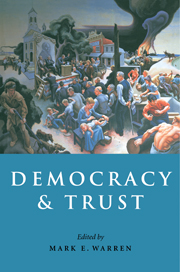Book contents
- Frontmatter
- Contents
- List of figures
- List of tables
- List of contributors
- Acknowledgments
- 1 Introduction
- 2 Do we want trust in government?
- 3 How can we trust our fellow citizens?
- 4 Trust, well-being and democracy
- 5 Democracy and social capital
- 6 Liberty against the democratic state: on the historical and contemporary sources of American distrust
- 7 Trust, voluntary association and workable democracy: the contemporary American discourse of civil society
- 8 Trust and its surrogates: psychological foundations of political process
- 9 Geographies of trust, geographies of hierarchy
- 10 Altruistic trust
- 11 Democratic theory and trust
- 12 Conclusion
- Index
7 - Trust, voluntary association and workable democracy: the contemporary American discourse of civil society
Published online by Cambridge University Press: 15 March 2010
- Frontmatter
- Contents
- List of figures
- List of tables
- List of contributors
- Acknowledgments
- 1 Introduction
- 2 Do we want trust in government?
- 3 How can we trust our fellow citizens?
- 4 Trust, well-being and democracy
- 5 Democracy and social capital
- 6 Liberty against the democratic state: on the historical and contemporary sources of American distrust
- 7 Trust, voluntary association and workable democracy: the contemporary American discourse of civil society
- 8 Trust and its surrogates: psychological foundations of political process
- 9 Geographies of trust, geographies of hierarchy
- 10 Altruistic trust
- 11 Democratic theory and trust
- 12 Conclusion
- Index
Summary
The relationship between democracy and trust has moved from the periphery to the center of debate among political theorists in recent years. After the “state was brought back in,” democratic theorists began to focus on ways to ensure the responsibility and accountability of government officials (Skocpol 1982). Liberals sought protections for the expansion and exercise of rights while debating with conservatives and democrats over the appropriateness of rights rhetoric, litigation and the role of the courts. Paradoxically, the more ubiquitous the administrative and regulatory state became, the more it appeared to trigger entitlement claims that, in turn, seemed to call forth more top-down administrative and judicial “state action.” This apparently uncontrollable spiral seemed to threaten both democracy and personal freedoms and to undermine the “habits of the heart” that make liberal democracies work. Small wonder that questions regarding the social and cultural presuppositions of democracy in general and, in particular, the sources of trust in government and in one another on the part of civil actors have now moved to the fore.
In the United States, this conundrum has led in recent years to an intense debate about civil society. The role of civil society in generating social trust, and hence in contributing to social coordination, and its relation to effective and responsive democratic government are the key issues. The guiding idea behind the contemporary American discourse of civil society is that trust is necessary for social integration, for civic engagement, and, hence, for vibrant democratic institutions and that it is generated in voluntary associations.
- Type
- Chapter
- Information
- Democracy and Trust , pp. 208 - 248Publisher: Cambridge University PressPrint publication year: 1999
- 49
- Cited by



